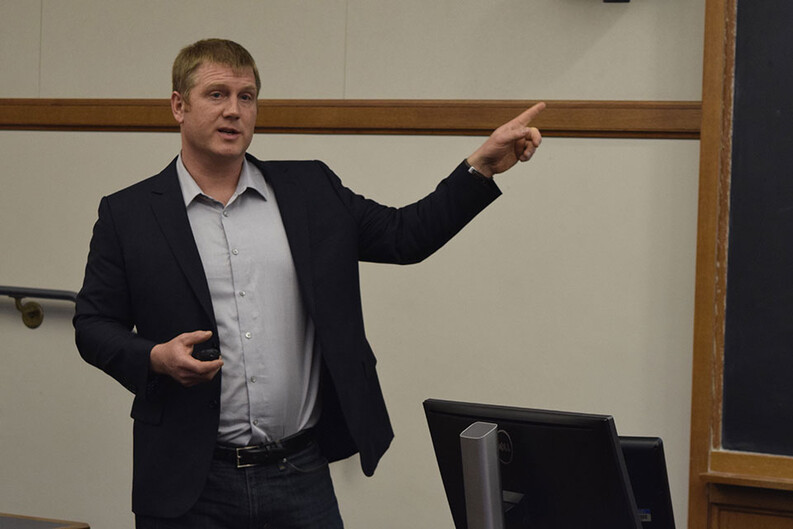Harbaugh ’08 of Team Rubicon Speaks to Students

Ken Harbaugh ’08, president of Team Rubicon, spoke to students on March 30. The talk, which was sponsored by Schell Center, focused on Harbaugh’s inspiration for starting the nonprofit.
Leaving behind a nine-year career as a naval pilot for Yale Law School was a drastic transition for Harbaugh. Lacking the strong sense of purpose he had had in the navy and surrounded by people who sometimes were not even aware of the wars his friends were still fighting, he began visiting wounded marines at Betheseda Naval Hospital. There, where he thought he would be delivering hope, he found that it was not needed. The patients just wanted to be useful––“to be seen as assets,” he said, “not liabilities.” One soldier told him, “I lost my legs. That’s all. I did not lose my desire to serve, or my pride in being an American.” Those words set Harbaugh on the path to becoming the president of Team Rubicon, a nonprofit he discussed with the Schell Center on Thursday March 30.
Team Rubicon is an organization, which, in Harbaugh’s words, turns two distinct problems into the solutions for one another. The first problem is the difficulty veterans often have in transitioning back to civilian life; the second is an increasing number of natural disasters. Veterans have unique skill sets that allow them to respond with extreme efficacy in disaster situations, and having the opportunity to help others offers veterans a chance to regain their sense of purpose. As one volunteer from Team Rubicon in the audience explained, the experience of volunteering with the organization could be summed up with “the word love.”
With Team Rubicon, Harbaugh has been a part of and overseen responses to a wide range of disasters, from wildfires in Canada to the devastating typhoon in the Philippines. In the future, he hopes that the organization might expand into man-made disasters, like the refugee crisis in Europe; however, he said that it was far more difficult to raise the funds to address those cases. Americans simply did not want to contribute money toward refugees, Harbaugh lamented. Team Rubicon is limited, he admitted, by the marketability of the disasters they address.
Nonetheless, the organization has had an enormous impact both on the communities it has served and on the veterans who are a part of it. Harbaugh ended his presentation with the story of a volunteer named Ryan, who returned from the army severely depressed and suicidal; through Team Rubicon, he rediscovered his purpose––and met his wife. After serving on a mission in Colorado, the two spontaneously held their wedding in a Home Depot parking lot, under a military guard of shovels instead of swords, surrounded by their fellow volunteers.


